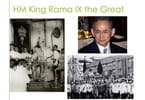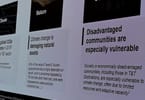There is virtually no country in the world free of diaspora populations and illegal immigrants for that matter. The attention paid to them has been a function of the publicity they generate, whether negative or positive and how the host countries have created a success story or an anathema out of this phenomenon.
Migration is as old as history and humanity itself. However, successful host states have a strategy around the opportunity spawned by “foreigners” or “alien” communities. The Old Testament accounts of Potiphar and Pharaoh’s treatment of Joseph in Egypt symbolize how as long as these diaspora populations are serving the national interest of their host countries and positively interpreting its national vision, they can be facilitated to reach their points of self-actualization.
Joseph arrived in Egypt through the back door, penniless, dejected, tired and rescued from sure death in the pit. He had previously been sold into slavery to his final destination, Egypt. His story symbolizes the initial adversarial and settler experiences of the African diaspora, wherever it is; it generally makes it outside the country. Contemporary Pharaohs see the value that “brothers” back home persecute, ignore and refuse to see.
Joseph was persecuted by his own for daring to share a vanity dream, and for being loved the most by his father, stirring jealousy that nearly got him killed. Africans, like the brothers in the Joseph story, are yet to celebrate their diversity and differences in peace and harmony, and millions of African citizens today are displaced by political persecution, jealousy, poverty, and conflict.
The Westminster type of democracy in itself, a post-colonial emulatable model, is yet to be fully understood and enshrined properly in African versions of democracy which cannot brook opposition to the ruling parties nor criticism of ruling governments, particularly its “dear leaders”.
Africans are still “ruling” and not governing each other, and the word “ruling” has a chilling pejorative connotation synonymous with kingship and monarchies of the brutal 12th century where the kings, in the order of King John of England, were the law of the land. The contemporary definition of “ruling” is not understood even by the few remaining monarchies in the world, let alone ancient Pharaohs!
However, Africans themselves may need to fast track lessons on their aspirations on good governance, including sound economic management, to change their circumstances. These should include how to be good Josephs in the communities that host immigrants, starting with the understanding that their hosts see themselves as shareholders expecting a decent return on investment from aliens who may be employees or an entrepreneurial class.
The hosts think immigrants should sweat more than them, adapt more to the host’s culture, respect their hosts and indeed complement them in their transformation agendas. Immigrants should organize themselves not to offend even as they prosper, and seek to share and enjoy in humility, dignity, and respect; and never to create socio-economic gaps that engender resentment and inter-communal conflicts.
Joseph’s behavior and conduct, whether in prison or royal splendor, took away his host’s “worries and fears of an alien”. Everything ran “smoothly” for them, and in return, he was given “complete administrative responsibility” over the country – a position which, in the case of the Pharaohs, was the equivalent of a prime minister. An important perk attached to the position was a wife from the famous Priesthood of On. To complete his naturalization, Joseph was renamed Zaphenath-panel!
Thus, contemporary host countries themselves should seek to organize, and reorganize, introduce structures and create an enabling environment for optimal performance and efficient contribution of the immigrants. Pharaoh had imperial authority, but in his wisdom, he also recognized the spiritual authority in Joseph and hence the assertion, “Can we find anyone else like this man so obviously filled with the spirit of God?”
He asked his officials this question according to Genesis 41:38 in response to Joseph’s accurate and incisive interpretation of his repeated dream, forecasting seven lean years preceded by seven years of plenty. Modern-day food security strategies and forward planning go back to the deployment of Joseph as “the man for the job”, to avert an impending food crisis that was later to stalk not just Egypt but the entire neighborhood region.
How often do we hear the narrative, “Zimbabweans are very educated people, very intelligent” – but if their education or intelligence replaces local intelligentsia at the head and management of corporations or as we often hear that “Zimbabweans are hard workers” and that hard work turns into displacement of indigenous populations at the shop floor, in restaurants, hotels, service stations they will become targets . This will turn admiration into jealousy and ultimately resentment. Zambians are no different from Zimbabweans often considered siamese twins. Malawians carry a” loyalty “tag, but this protects them only in affluent suburbia whilst Nigerians and Congolese are considered “loud” and “show-offs” but very “entrepreneurial” in what South Africans consider “reserved sectors” for themselves. So it is not unusual to see them “colonize” entire neighborhood and pavements in downtown sections of South African towns in the process exposing themselves easily as resentment targets. I have mentioned these four nationalities deliberately seemingly as they appear to be targets of black on black crime and self-hate by the black South African, and also counsel them where I feel there may be deficits in how they are perceived which in itself may be part of what i also allude to as the “source” of bigotry at this level, an introspective approach. I also raise it because if it was really xenophobia in the true sense of its definition, it would target other nonblack nationalities. It is crude and criminal political messaging; “go back home and fix your countries ”
Diaspora populations should never organize for crime or cultural resistance but seek to understand and integrate peacefully. The benefits of over-tourism and cross-border shopping, if unexplained to host communities, generate envy which may ultimately turn to resentment and hatred. Diaspora populations must organize above all for their enfranchisement, their ability to vote away from home or at home and change and influence the politics of their countries and ultimately their home economies. They must be to a large extent together with their home populations be responsible for who is governing them and the attendant policies, and this should be SADC core business, guaranteeing diaspora voting at all cost. The ritual Easter and Christmas EXODUS along N1 to Beitbridge Border post by Zimbabweans for instance if done during the Zimbabwean voter registration and voting seasons will certainly usher change and make the diaspora change agents and responsible for what happens in their home politics and the economy and make them collaterally liable for better or for worse, not inactive victims .
The endgame of Joseph’s story, of course, is that 400 years later there arose a Pharaoh who knew nothing about Joseph or what he had done, and he said to his people “…look the people of Israel now outnumber us, and are stronger than we are”. The now flourishing diaspora community threatening in numbers and wealth triggered the famous Exodus! Of course the end game story for us and many believers were part of God’s plan to fulfill his promise of the “promised land “to Abraham, so the loss of memory or absence of it by this latter-day Pharaoh was part of God‘s plan, without which there would be no Messiah and the New Covenant !
That notwithstanding, these inherent fears of the diaspora are as old as history itself and should be anticipated and managed. Ultimately we must make the home countries of diasporans and immigrants to work, their economies must work and offer hope, security and opportunity to their citizens, at least the majority of them.
The second fast track lesson, this one for African policymakers and scholars, is a careful benchmark study of the Dubai (UAE) model. They should assess how two million indigenous citizens are served by eight to ten million different nationalities – from menial jobs to chief executives of corporates – and life goes on without a fuss or xenophobia as we understand it now. Certainly, people do not just arrive in Dubai, there is a strict classification of visitors in every respect and purpose, and depending on the value placed on each visitor, and some end up as permanent residents.
The problem of unplanned arrivals, intra-Africa migration being a case in point, must also be examined at the source, and two issues stick out: poverty and conflict. Conflict habitually emanate from failed and contentious governance. The pull factor to countries like South Africa is liberty, freedom, sanctuary and glorious economic opportunity – which in itself is a manifestation of sound economic governance.
Even the leader of a country north of the Limpopo when he was under siege from an emerging conflict in his country, made his escape to South Africa. The unanswered question in accounts capturing his “famous” escapade is why he did not camp in Mozambique, Malawi or Lesotho? The answer is simple, it is because South Africa embodies the minimum requirements of human rights in Africa, its Institutions still work freely and fairly and beyond it is the sea or ocean and certain death. Its crime record hardly constitutes insecurity to the job or opportunity hunter let alone political fugitives. Equally, its justice system can still be trusted.
The leader fugitive I refer to earlier, felt safe in South Africa not anywhere else, notwithstanding high crime statistics in the country. South African crime does not translate into insecurity in the conventional sense of being threatened by your own State, hence the politically and economically insecure continue to flock and arrive. What alarms the world and certainly Africans is xenophobia/ Afrophobia especially when its turns violent, and is characterized by looting, burning and killing of victims and this should be dealt with decisively beyond just the rhetoric of “condemning ” it. It is not State-sponsored and therefore the work of criminals.
South Africa should, therefore, be proud of its place in the history of nations for being the last of independent African countries but seemingly the safest sanctuary and the ultimate guarantor of human rights bar this latest creeping culture of xenophobia.
South Africa known to Africa in liberation lingo as Azania, is geographical, the southern part of Africa, non-totemism, and somehow because of this nomenclature, it is seen as a sanctuary, a place of safety, security, opportunity and a true Rainbow Nation equivalent to what the United States of America is to Latinos and Hispanics in their pursuit of the “American Dream!”, whose statue of liberty embraces all humanity regardless of race, gender, religion or creed. Thus for South Africa, by comparison, this is the cherished position they should leverage in a bid for a permanent seat in the UN Security Council, but how can Africans entrust them with such privilege and honor with these infrequent outbursts of xenophobia which point to historical amnesia?
Dealing with xenophobia without acknowledging and examining the causative factors of how this tide of human influx to countries like South Africa comes into being is a casual approach to a very serious matter in our midst. Poor governance alone causes economic misery and tribulation, which force people to move out of their domains of birth as much as physical conflict and war do.
In fact, bad governance and of late State capture, corruption, and economic misery instigate far greater migration consequences than war itself. It is here where peer review of the African leadership and governance within the framework of the NEPAD Peer Review Mechanism, must extend itself to evaluate both governance and economic management among the African spectra of leadership.
Through this diplomatic sounding board, leaders should start better management of the economies in migration-source countries and prevent pushing their citizens out. Governments need to emphasize the enunciation of pro-poor economic policies and resource optimization that benefits all through Broad-Based Economic Empowerment (BBEE) models and deemphasize kleptocracies and elite-resource- capture business modeling. The latter is now increasingly under the gaze of restive populations.
A growing literate class, full of graduates without jobs in Africa is a threat. Many are losing hope on Bretton Woods, World Bank and IMF prescriptions that have visited Africa before and left a trail of economic destruction in their wake – this is a cause for introspection and a review on what can lead to the “Africa We Want”.
The second coming of these austerity measures unaccompanied by homegrown national visions for prosperity is clearly driving this exodus into better-performing economies. There is no flesh anymore to “tighten the belts”, and any solution that fails to give hope and realistic promises to people, and in its implementation signpost more suffering before prosperity has no takers for a people who only live once and consider themselves a lost generation.
Whilst I note the usual responses from SADC and African leaders themselves couched in diplomatic verbiage “condemning ” xenophobia or in extreme anger boycotts of calendarized events like sport and business events I posit the need for deeper insight into this matter to examine the causative factors at the source as sustainable solutions to this scourge. Equally retaliatory acts in migrant source countries and South Africa itself will only exacerbate the problem. This, however, cannot exonerate South Africa from responsible policing, preemptive in nature which should anticipate these criminally motivated outbursts of xenophobia.
Back to peer review, it’s an unpleasant subject diplomatically, especially for those countries that may not want to be put on the spot for misgovernance of economies and poor leadership of their states, but it’s a necessary step that will serve South Africa better and more sustainably in the long term.
Going forward, this should lead to a regional summit on xenophobia, not just focused on “bashing” South Africa which is the easiest and most convenient thing to do, but even more importantly on analysing the causative factors in the recurrent problem, holding each other to account prescribing workable solutions, one of which is clearly a regional “Marshall Plan” to drive development, economic empowerment and job creation. Africa is too richly endowed resource-wise to be poor, the second scramble for its resources is currently underway with no clear obligation or integrated plan on its Emperial drivers to create employment in the continent through value addition. Sadly raw materials are exiting the Continent in millions of tons and generating employment outside, and the poor African youth follows kowtow as an illegal immigrant. Inside Africa, South Africa despite its own unemployment rate of 27% is, unfortunately, a destination for these desperate Africans, who is a highly unionized country accept below bargain wages crowding out a restive indigenous people with their own deferred dreams. I must hasten to say that the “criminal element “in South Africa is exploiting Xenophobia or Afrophobia as excuses for easy crime and this is a subject of another article to come separately but suffice to say the substitution of local labor in non-critical skills areas by Industry and Commerce in what appears to be an organised preference by employers for cheap labour is in itself a potential source of conflict.
One of God‘s purposes in creating man was to establish dominion over resources, prosper and multiply, but it seems the African is now a victim of a resource curse. The greater the endowment of an African country resource-wise, the gorier its poverty curse, and the more per capita it sponsors emigrants. This has to stop!
Onye isi obodo
An Expert in International Relations
The Ụlọ ọrụ njem nlegharị anya Africa ụnyaahụ condemned the recent violence in South Africa.
IHE Ị GA-Ewepụ na edemede a:
- Africans are still “ruling” and not governing each other, and the word “ruling” has a chilling pejorative connotation synonymous with kingship and monarchies of the brutal 12th century where the kings, in the order of King John of England, were the law of the land.
- Everything ran “smoothly” for them, and in return, he was given “complete administrative responsibility” over the country – a position which, in the case of the Pharaohs, was the equivalent of a prime minister.
- The Old Testament accounts of Potiphar and Pharaoh’s treatment of Joseph in Egypt symbolize how as long as these diaspora populations are serving the national interest of their host countries and positively interpreting its national vision, they can be facilitated to reach their points of self-actualization.






















